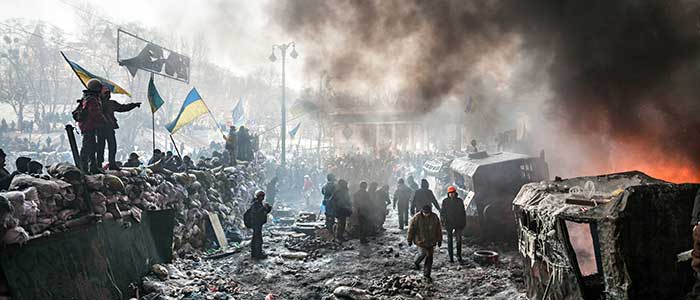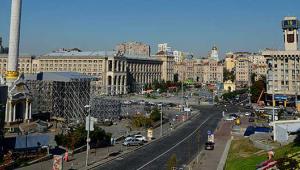Web_Ukraine_shutterstock_173329988.jpg

Mass anti-government protests in Kiev, Ukraine January 2014
The IMF approved a four-year $17.5bn bailout for Ukraine last year as its economy was plunged into recession following the outsting of the pro-Russian president Viktor Yanukovych, subsequent attempts to sever structural ties with Russia and tensions between pro-Russian separatists and the government.
But the ongoing political squabbles and upheaval and the resulting patchy and slow implementation of reforms, mean the IMF’s billion dollar support could be withdrawn.
On Monday, Ukraine’s finance minister Natalia Yaresko said the IMF would not give any more aid until it becomes clear that, in the event of government collapse, the next administration followed through on promised reforms.
But IMF managing director Christine Lagarde weighed in today saying “without a substantial new effort to invigorate these reforms it is hard to see how the IMF-supported programme can continue and be successful”.
“I am concerned about Ukraine’s slow progress on improving governance and fighting corruption, and reducing the influence of vested interests in policymaking,” she said.
“Ukraine risks a return to the pattern of failed economic policies that has plagued its recent history. It is vital that Ukraine’s leadership acts now to put the country back on a promising path of reform.”
The IMF’s $17.5bn programme relies on the implementation of structural reforms, particularly focused on governance and anti-corruption but also covering tax administration, state-owned enterprises and other measures towards stronger public finances and financial stability.
The fund has been withholding a $1.7bn tranche of aid while waiting for cuts to the pension system and stronger anti-corruption efforts.
The resignation of reform-minded economic minister Aivaras Abromavičius and his team last week shone an uncomfortable light on the slow pace of reforms enacted by the country’s president Petro Poroshenko and his coalition government. He had been championed as a reformer by western backers.
But Abromavičius’ resignation letter said he had quit because he had no “desire to serve as a cover-up for the covert corruption, or become puppets for those who, very much like the ‘old’ government, are trying to exercise control over the public flow of funds”.
His letter said that corrupt officials had blocked systematic reform and were attempting to gain influence over state-owned enterprises like the troubled natural gas company Naftogaz.
Abromavičius claimed high-ranking MP Ihor Kononenko of attempting to place a deputy economic minister at the helm of Naftogaz and other cronies as management of other state companies.
Ukraine’s Anti-Corruption Bureau, established in 2014, has opened a criminal investigation into the allegations, which have been supported by ten western ambassadors including those of France, Germany, the UK and US.
Last week, Lagarde said Abromavičius’ resignation was “of concern” but mentioned no changes to funding arrangements.
In December, the IMF warned its bailout programme could be disrupted if the Ukraine parliament rejected the government’s 2016 budget and key tax reforms, which were in line with the objectives of the IMF’s programme.
Ukraine depends on money from the IMF, the US, the UK and the European Union to keep its economy afloat after it contracted by more than 10% last year.
Ukraine’s troubled government could face a no confidence vote around the middle of February.













